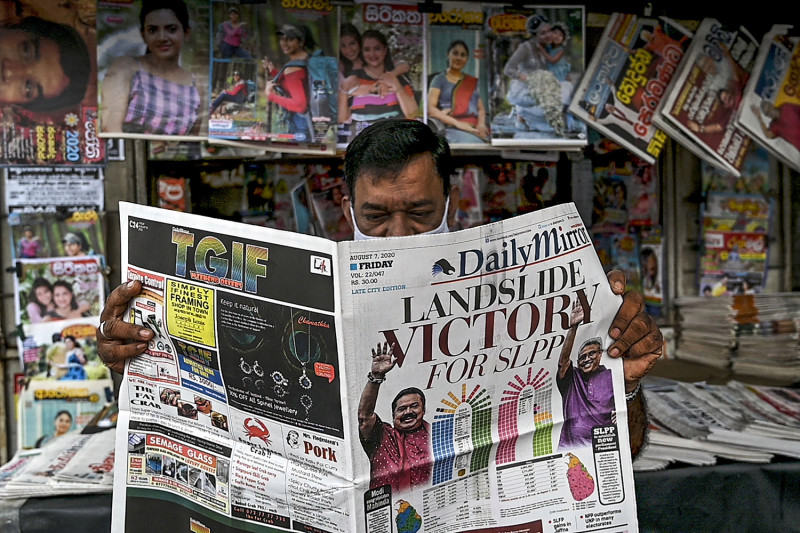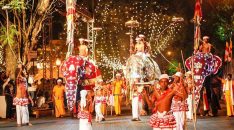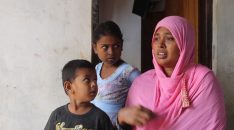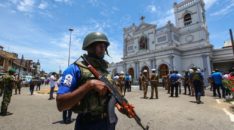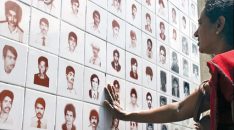By: Lionel Bopage
The general elections on 5 August had turned out to be an outstanding victory for the Sri Lanka Podujana Peramuna (SLPP), the Rajapaksa Family and the Sinhala Buddhist nationalists representing both the elite and ordinary members of the country’s majority community. Despite many allegations made about the corrupt and criminal acts of certain candidates put forward at the election by some of the political parties, the electorate elected most of them. Sadly, the candidates who are known for exposing corruption and criminality in the country – the very people who have demonstrated their credentials to be promising parliamentarians – have not been elected. At the same time, it is heartening to note that some of the candidates who were credibly alleged to be robber barons during the 2015 regime have been outed.
Those who planned the election campaign of the SLPP have undoubtedly achieved their expected outcomes. From my point of view, a victory of this magnitude provides a great opportunity which could be used for the benefit of the country and its people. It also brings up a more worrisome scenario where militarisation of the democratic institutions will continue, concerns of minorities will be ignored, and erosion of the rule of law and less transparency and accountability are most likely to occur. This victory has opened a new chapter where the government could perform at its best or at its worst.
Best case scenario
The architect of the SLPP recently made a statement saying that the new regime “respects the opinions and views of the people, will continue to represent the needs of the people after forming a government”. With the thumping majority they have got in the parliament, they should have no excuse for not doing what is needed for the benefit of the society. When the Rajapaksa regime led the campaign to defeat the Tamil militancy solely based on a strategy of war, we were critical of that approach. After the military defeat of the LTTE the regime had a unique opportunity to address the issues that caused the civil war by developing a just solution to the Tamil National Question. Even now these issues remain unresolved and keep festering. A historic opportunity was missed. Had this been handled with honesty and statesmanship, it could have paved the way for the regime to stay in power for a long time, with the possibility of Mr Mahinda Rajapaksa even becoming a Nobel laureate.
Sri Lanka had several such opportunities in the past when different political persuasions were brought to power by the electorate with a two-thirds or even higher majority. Mr S W R D Bandaranaike, Mrs Sirimavo Bandaranaike and Mr J R Jayawardena, all had the same opportunity, but they did not rise to the occasion due to their self-centred desire to remain in power which they could only do by catering to the partisan needs and demands of their political factions. Most of the time, these factions could not see beyond the tunnel vision of a monocultural unitary state and their own corrupt financial interests.
The SLPP campaign was based on the premise that the government of Sri Lanka has been at the mercy of the minority parties – as constituent parties in the parliament – with regards to policy formulation. In fact, from 1956 till 2015, the minority parties did not play any major policy determining role as constituent parties of government. Despite this, for nearly 60 years there was no constructive solution proposed or implemented to address the numerous issues the minority communities had raised. Now that the new government is free from the elements that the SLPP identified as “racist”, there is another great opportunity to concretely address the power-sharing issues with minorities and create a better country for all.
This is the best possible scenario I could hope for against all historical precedents.
Worst-case scenario
At the election, the plea of the SLPP leadership was to grant them a two-thirds majority to change the constitution to rearrange the power relationships between the parliament and the president. Yet, under the current constitutional arrangements, the brothers, Gotabhaya and Mahinda continue to enjoy the totality of presidential and prime-ministerial powers between them. Whatever the changes that would be made in the future, the totality of constitutional power shared between the two brothers will remain the same. Only the ‘checks and balances’ that scrutinise their activities by parliament and independent commissions are open to manipulation.
Having received an overwhelming majority and not at the mercy of the so-called minority parties that the SLPP and the Rajapaksas have been identifying as ‘racist’, they have now got an opportunity to carry out their long-term political intentions unhindered. What they proposed was to modify the constitution by abolishing the 19th and 13th amendments. Discarding these safeguards will abolish the devolutionary nature of the governance established under those amendments and debilitate the independence of the institutions that were established to scrutinise the process of governance.
These amendments were adopted with the intent of addressing certain fundamental issues that prevailed for many long years. However, that intent was wantonly diluted from the drafting stage onwards, and even before the bill was presented to the cabinet for approval. It was further diluted by last-minute amendments made during the final parliamentary proceedings. Some of those responsible for such dilution later became leaders of the SLPP government, while others joined the ranks of parties like the Samagi Jana Balawegaya.
The new parliament has the opportunity to address such deficiencies by following a due and diligent process. What new constitutional arrangements and mechanisms would be proposed to address these deficiencies? Would the new arrangements and mechanisms strengthen the ‘checks and balances’ needed in a democratic form of governance? Or would the ‘checks and balances’ and scrutiny be further hampered in their quest for a more authoritarian system of governance? Would the new arrangements and mechanisms be finalised in consultations with the people? We need to wait and see what the government proposes to do in this regard.
The Chairperson of the SLPP, Emeritus Professor G.L. Peiris, has stated that any constitutional amendment process ‘would only be carried out after much thought and consideration’. When we look back at the 1970s, the Constitution of 1972 and the Constitution of 1978 were imposed upon the people without any consultation. The constitution making process was neither participatory nor inclusive. Thus, those two constitutions cannot be considered to reflect the views of all peoples of Sri Lanka. In light of the fragmented nature of our society and the demands for transparency, accountability and human and democratic rights, only an inclusive constitutional reform would help bring our communities together. The current environment can be made use of for building consensus among the diverse citizenry through a participative process. Such a process, if handled sensitively, will pave the way for developing a constitution that would be acceptable to all parties involved.
If we accept the notion that the sense of morality lessens when the power of the rulers become greater, we encounter a different scenario. Power tends to corrupt; absolute power corrupts absolutely is unfortunately the norm. The regimes in Sri Lanka such as the previous Rajapaksa regime were tainted with allegations of abuse, corruption, criminality and autocracy. If the new government were not to deliver a more socially just, economically fairer situation for the society as a whole, it would indicate their lack of vision, policy frameworks and programmes of action to lead a unified nation to address the prevalent issues.
Nationalist extremists in the new regime could negatively influence the chances for justice, democracy, human rights and economic opportunities, except for a select few. This may lead to escalating corrupt practices, disempowerment of the judicial and parliamentary processes, ignoring legislative responsibilities, sidelining non-majoritarian communities, ethno-religious discrimination in policy and decision making, adopting antagonistic foreign policy positions, and introducing repressive legislative and constitutional arrangements as has been done in the past. There could be protests and strikes by the disillusioned electorate, who would be forced to rethink about who they have brought into power. It could also lead to bloodshed as has previously happened in Chilaw and Rathupaswala. Instead of a break from the past this will bolster the unacceptable vicious cycle with a new vigour demanding equality, justice and accountability.
Gap between the intelligentsia and the ordinary
The election results also reflect a class divide between the intelligentsia and the ordinary people of the country. The low vote for the National People’s Power (NPP) and similar organisations represents the mismatch of the thinking patterns between the people at the grassroots level and those of the intelligentsia. The necessity of the traditional organisational patterns at the grass roots level does not appear to have been of importance. The urban intelligentsia, mostly professionals, want a regime for good governance, rule of law, and an economic model that would cater for the increasing profitability of a few.
The working people, both rural and urban, however, want to elect a regime that would provide them with work opportunities that satisfy their basic needs, such as shelter and food for the survival of their families. In any political and economic endeavour, both these needs need to be catered for. This can only be done by analysing the prevailing issues based on evidence and their causes. Only then can these issues be addressed and polices developed that address these issues at the ground level. Otherwise the election results for progressive parties will continue to be abysmal, as has been the trend for at least two decades.
We often speak of a high literacy rate in Sri Lanka, but it seems to refer only to those who have the actual ability to read and write. Such a literacy level has not developed the ability at a societal level or the capability at an individual level to develop political empathy in understanding the differences between a monocultural society and a multicultural one with its attendant advantages for long-term peace and prosperity. Is this caused by a tendency to suppress critical thinking ability in the educational process? Does the tertiary educational structure deal with the socio-political issues prevalent in Sri Lanka?
There is unfortunately a global trend in which a strong segment of nationalist intelligentsia does not focus on the betterment of society and the long-term future of the generations to come. Instead, they, like ‘Viyath Maga’ in Sri Lanka and their collaborators, appear to focus on developing better ways for duping people, promoting individual self-greed with short-term emphasis. Even during the 1920s in Germany, similar intellectual groupings helped Hitler to gain and sustain power, while the media similarly played the role of providing publicity only to Hitlerite Nazi views.
Ordinary people will attend a meeting; listen to leaders and go back home, later to be trapped by the political and idealist influences of the mass media and the organisational networks that largely serve the interests of the privileged and the ultra-nationalists. Without organisational networks at the grass roots level to mobilise people and counter such influences, the efforts of the intelligentsia will fail as attested by the current elections.
In addition, ordinary people who had been previously politically active may have perceived those trying to influence them from the top as leaders, intellectuals or outsiders as a threat rather than working for the collective benefit of all. It had become increasingly difficult to expose the misleading positions presented by the nationalist intelligentsia to the people at the grassroots level due to the barrage of misinformation spread via strong media campaigns. The election results confirm the success of the nationalist intelligentsia and a notable failure of the efforts of the more pluralist orientated approach of the intelligentsia.
The future
The disastrous failure of the political forces that value plurality, diversity, equity, fairness and social justice to get political traction compels us to rethink, re-strategize, regroup and reorganise. Such an effort cannot be made by daydreaming or being an armchair critic. Our most urgent priority is to connect with the ordinary working people both rural and urban; enter into a dialogue with them, learn about the issues that concern them most; and then produce evidence based and consensually agreed solutions on issues that affect their lives.
This will provide the opportunity to critically examine the previous approaches and re-strategize for the future. Only then we could work towards an alliance that is open to all people travelling in the same direction, who are taking diverse paths for achieving the same goals of prosperity, human rights, rule of law and good governance, that will benefit all members of Sri Lankan Society not just a few.
Sri Lanka’s post-independence history has witnessed on several occasions, regimes coming to power with a two-thirds or a higher majority. Yet they failed, and failed abysmally, leading the country into three major rebellions. Afterwards, the regimes that led to such situations have also been defeated. If the new government traverses a path creating better opportunities for all and a rule-based society that values individual life, treats everyone with dignity and respect, ensures a guaranteed minimum standard of living, and empowers people so they may develop their full potential – then we have a duty and responsibility to support such moves.
Otherwise, it would not be too long before the disillusioned voters take to the streets demanding implementation of the many pledges made to them, in particular the improvement of their socio-economic conditions, in an organised and democratic manner.
9 August 2020

